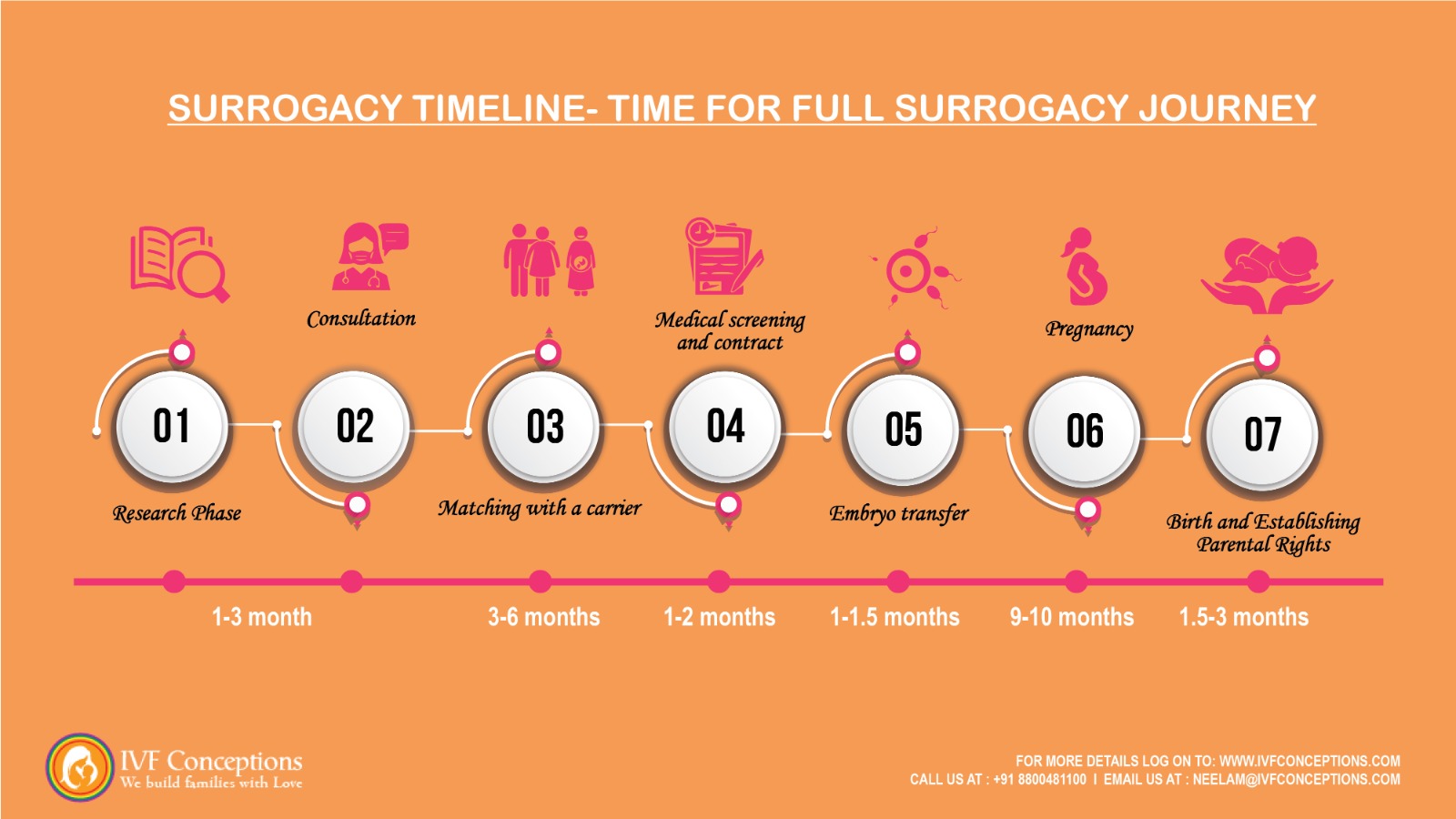Having a Baby Through Surrogacy: Your Guide
Thinking about surrogacy to grow your family but not sure where to start? Surrogacy is a growing choice for those who can’t have kids the usual way. But, it can be a bit tricky to understand. In this guide, we’ll cover everything from the basics to the legal and financial sides.
- Book an online appointment: Get a free online consultation.
- Call\W:+91-8800481100 Email:neelam@ivfconceptions.com
Key Takeaways
- Surrogacy is an assisted reproductive technology where a woman, called a surrogate or gestational carrier, carries a pregnancy on behalf of intended parents.
- There are two main types of surrogacy: traditional surrogacy and gestational surrogacy, with gestational surrogacy being more common in the U.S.
- The surrogacy process involves legal contracts, in vitro fertilization (IVF), and various legal and financial considerations.
- Surrogacy can be a costly endeavor, with the average cost ranging from $80,000 to $120,000.
- Surrogacy laws vary by state, and it’s essential to understand the legal landscape before embarking on your surrogacy journey.
Additional Resources to Read:
Understanding Surrogate Age Requirements
Cheapest Countries for Gay Surrogacy
What is Surrogacy and How Does it Work?
Surrogacy is when a woman, called the surrogate, carries and delivers a baby for someone else. This can be for a single person or a couple, known as the intended parents. There are two main types: traditional and gestational surrogacy.
Traditional Surrogacy vs. Gestational Surrogacy
In traditional surrogacy, the surrogate is the baby’s biological mother. This happens when her egg is fertilized by the intended father’s sperm through artificial insemination. On the other hand, gestational surrogacy is more common. Here, the surrogate carries an embryo made from the intended parents’ or a donor’s egg and sperm through in vitro fertilization (IVF). The surrogate has no genetic link to the child in this case.
Understanding the Surrogacy Process

The surrogacy process includes several steps. These are:
-
- Screening and legal agreements between the intended parents and surrogate
- Medical procedures like IVF to create the embryo
- Embryo transfer into the surrogate’s uterus
- A close relationship between the surrogate and intended parents during pregnancy
Surrogacy laws differ by state. Legal contracts must cover important topics like compensation, pregnancy responsibilities, and risks. The cost of gestational surrogacy can be high, ranging from $50,000 to over $150,000. This is due to legal fees, medical costs, agency fees, carrier compensation, and location.
| Characteristic | Traditional Surrogacy | Gestational Surrogacy |
| Biological Connection | Surrogate is the biological mother | Surrogate has no genetic connection to the child |
| Conception Method | Artificial insemination | In vitro fertilization (IVF) |
| Legal Considerations | More complex due to biological connection | Simpler as surrogate has no genetic tie |
| Popularity | Less common | More common in the United States |
Reasons to Consider Surrogacy
- Helps those who can’t carry a pregnancy: Surrogacy offers a life-changing solution for women with uterine issues, high-risk pregnancies, or those who have had a hysterectomy, allowing them to have a biological child.
- Ideal for LGBTQ+ couples: Same-sex couples can pursue surrogacy to create a family while maintaining a biological connection to their child.
- Option for single parents: Surrogacy provides an opportunity for single men and women who wish to have a biological child to become parents.
- Overcomes infertility challenges: Surrogacy provides hope for intended parents facing infertility or recurrent pregnancy loss, offering a viable path to parenthood.
- Allows for genetic connection: Unlike adoption, surrogacy enables intended parents to have a genetic connection to their child through IVF and embryo transfer.
- Support from medical advancements: Assisted reproductive technologies (ART) have made surrogacy a reliable and increasingly successful option for intended parents.
- Flexible family-building option: Surrogacy is an inclusive solution for diverse family structures, including non-traditional families, and those who face medical or fertility obstacles.
- Empowers surrogates: Many surrogates are motivated by the opportunity to help others create families, finding the experience emotionally rewarding.
- Controlled and guided process: Surrogacy offers a structured, legally supported process where the journey is carefully managed by medical and legal professionals, ensuring clarity for both parties.
These expanded points provide a comprehensive view of why surrogacy is a valuable option for many different people and families.
Medical Conditions Preventing Pregnancy
Some health issues make it hard for women to carry a baby. Heart disease, kidney disease, severe diabetes, or some cancers are examples. Surrogacy can help these individuals have a family despite these challenges.
LGBTQ+ Families and Single Parents
Surrogacy is becoming more common for LGBTQ+ couples, especially gay men, who want a biological child. Single parents, no matter their sexual orientation, might also choose it. It’s a way to start a family when other options don’t work.
Surrogacy can be a life-changing journey for those facing pregnancy obstacles. With a good surrogacy agency, intended parents can welcome a child into their lives.
Finding a Surrogate Mother
Finding the right surrogate mother is key to building your family through surrogacy. There are many ways to connect with potential surrogates, each with its own benefits.
Working with a reputable surrogacy agency is a smart choice as they not only recruit surrogate mothers but do all the background checks.
Another option is a surrogacy matching program. These programs match you with a surrogate based on personality, interests, and location. They focus on building positive relationships and clear communication, making the journey smoother.
Or, you might find a surrogate through family and friends. This approach needs extra surrogate screening and legal steps. But, it can be a way to build your family with the support of loved ones.
It’s crucial to make sure your surrogate matching process fits your family’s needs. Working with experienced surrogacy agencies or professionals can make your journey more efficient and successful.
How to Have a Baby Through Surrogacy

The surrogacy process takes 18 months to 24 months depending upon the individual circumstances
Outlines the surrogacy process timeline for intended parents:
| Stage | Description of Stage | Duration |
| Research Phase | Explore family building options and decide on surrogacy. | Personal timeframe |
| Consultation and Application | Choose a surrogacy agency, sign agreement, and start embryo creation (if needed). | 1-3 Months |
| Matching | Agency finds and presents potential gestational carriers. Meet and decide on a match. | 3-6 Months |
| Medical Screening and Contracts | Carrier undergoes medical and psychological screening. Sign surrogacy contract. | 1-2 Months |
| Embryo Transfer | Prepare for embryo transfer. Success may take multiple attempts. | 1-1.5 Months |
| Pregnancy | Gestational carrier’s pregnancy, approximately 40 weeks. | 9-10 Months |
| Birth and Postpartum | Baby’s birth, establish parental rights, and postpartum period. | 1.5-3 Months |
Please keep in mind that the durations mentioned in the table are approximate and can vary depending on individual circumstances and other factors. Always consult with a reputable surrogacy agency or professional to get personalized guidance throughout the surrogacy journey.
The Surrogacy Agreement and Legal Requirements
Surrogacy means making a legal agreement that covers everyone’s rights and duties. This contract must follow your state’s surrogacy laws, as they differ across the U.S. It’s vital to have skilled surrogacy lawyers to make sure the agreement is valid and protects everyone involved.
The In Vitro Fertilization (IVF) Process
After the agreement is signed, the IVF process starts. This involves making an embryo from the intended parents’ or a donor’s eggs and sperm. The embryo is then placed in the surrogate’s uterus.
The surrogate carries the baby until it’s ready to be born. The intended parents usually attend the birth and gain full parental rights.
The whole surrogacy journey can take 15 to 18 months. It’s key to work with trusted surrogacy agencies and experts for a smooth and legal journey.
| Surrogacy Process Overview | Key Considerations |
|
|
Surrogacy can be complex, but with the right help, it can be a fulfilling way to have a child.

The Cost of Surrogacy
Starting a surrogacy journey is a big financial step. In the U.S., it can cost between $80,000 and $120,000 or more. This includes many expenses like the surrogate’s pay, agency fees, legal costs, medical bills, and more.
Average Cost Breakdown
Here’s what the average costs for surrogacy in the U.S. look like:
- Surrogate Compensation: $30,000 to $60,000
- Surrogacy Agency Fees: $15,000 to $30,000
- Legal Fees: $5,000 to $15,000
- Medical Expenses: $20,000 to $30,000 (including IVF, insurance, and other related costs)
- Additional Expenses: $10,000 to $30,000 (including maternity clothes, travel, lodging, and baby preparation)
Tips to Reduce Surrogacy Costs
While surrogacy costs can be high, there are ways to lower them:
- Choose a local surrogate to cut down on travel costs.
- Try to negotiate fees with the agency and lawyers.
- Look into financial help like grants or loans to cover costs.
- Plan carefully and budget for the journey to avoid surprises.
Budgeting for Your Surrogacy Journey
Good budgeting is key for a surrogacy journey. Intended parents should research and estimate all costs. This includes the surrogate’s pay, agency fees, legal costs, medical bills, and extra expenses. By making a detailed budget and looking for ways to save, parents can handle the financial side of surrogacy better.

Pros and cons of Surrogacy
Surrogacy has both good and bad sides for everyone involved. Thinking about this way to build a family? It’s key to look at the pros and cons of surrogacy carefully. This will help you decide if it’s the best choice for you.
Benefits of Surrogacy
One big benefit of surrogacy is that it lets one or both parents be genetically linked to the child. It also gives parents the chance to raise their child from the start. They can get close to the surrogate too.
Challenges of Surrogacy
Surrogacy has big challenges. It can cost a lot, up to $80,000 or more. This includes fees, medical bills, and what the surrogate gets paid. There are also tricky legal issues and a tough emotional journey for everyone.
Parents-to-be have to give up some control and trust the surrogate. The surrogate, on the other hand, faces a long and hard process. It can take a year or more from start to finish.
So, it’s important to weigh the pros and cons of surrogacy well. Getting advice from lawyers is key. They can help you understand the whole process and any possible problems.
| Pros of Surrogacy | Cons of Surrogacy |
|
|
For more info on the pros and cons of surrogacy and to talk about your situation, call the Parker Herring Law Group PLLC at 919-821-1860.
International surrogacy Options
Surrogacy laws vary worldwide, leading some to explore international options. It’s vital to research the legal aspects and risks of the chosen country thoroughly.
Popular spots for international surrogacy include the United States, Canada, Ukraine, and parts of Asia. In the U.S., laws on surrogacy vary by state. Some allow payment, while others only cover pregnancy costs. Surrogates in the U.S. can earn between $50,000 and $110,000, based on location and experience.
Many Southeast Asian countries have banned or restricted surrogacy. India and Thailand only allow it for their citizens, and China has banned it altogether. Success rates in some countries might be lower than in the U.S., which could increase costs due to the need for more attempts.
International surrogacy laws, country wise.
| Country | Eligibility for Surrogacy | Types of Surrogacy Allowed | Legal Protection for Intended Parents | Accessibility for Foreigners | Advertising for Surrogates |
| Australia | Altruistic surrogacy only | No donor or surrogate matching | Not applicable | Not applicable | Not legal |
| Canada | Altruistic surrogacy only | Not applicable | Not applicable | Altruistic surrogacy allowed | Not applicable |
| Greece | Heterosexual couples, single females | Not applicable | Not applicable | Foreign nationals allowed | Not applicable |
| Georgia | Heterosexual couples (including foreigners) | Compensated surrogacy | Well protected | Foreigners allowed | Not applicable |
| Ukraine | Heterosexual couples (including foreigners) | Compensated surrogacy | Well protected | Foreigners allowed | Not applicable |
| India | Indian citizens only | Commercial surrogacy allowed | Not applicable | Not applicable | Not applicable |
| Israel | Heterosexual Israeli citizens | Altruistic surrogacy only | Not applicable | Not applicable | Not applicable |
| Kenya | Locals and foreigners | Compensated surrogacy | Not legally protected | Not applicable | Not applicable |
| Laos | Foreigners only | Compensated surrogacy | Not legally protected | Foreigners allowed | Not applicable |
| Nigeria | Heterosexual Nigerian citizens | Altruistic and commercial surrogacy | Not applicable | Not applicable | Not applicable |
| South Africa | Heterosexual South African residents | Altruistic surrogacy | Not applicable | Not applicable | Not applicable |
| Thailand | Heterosexual Thai couples | Altruistic surrogacy only | Not applicable | Not applicable | Not applicable |
| UK | Not applicable | Altruistic surrogacy only | Not applicable | Foreigners cannot access | Not legal |
| USA | Gay and heterosexual foreigners | All forms of surrogacy | Well regulated | Foreigners allowed | Not applicable |
Travel costs for intended parents can be high in international surrogacy. They may need to travel multiple times for screenings, embryo transfers, and the birth. Communication can be tough due to distance, time zones, and language barriers.
The legal and citizenship aspects of international surrogacy are complex. A child might not get citizenship in the country of birth if the surrogate isn’t considered the legal parent. U.S. citizens should talk to an immigration lawyer to understand these issues.
In conclusion, intended parents must carefully consider the pros and cons of international surrogacy. They should work with skilled legal and medical experts to navigate the complex process.
Additional Resources to Read:
Is Surrogacy Legal in Mexico? Know the Facts
IVF vs IUI: Comparing Fertility Treatment Options
Conclusion
Building a family through surrogacy is a complex but rewarding journey. It needs careful planning, legal advice, and a strong support system. It’s a chance for intended parents who can’t carry a pregnancy themselves.
Surrogacy is a viable path to parenthood, whether due to medical issues, sexual orientation, or personal reasons. As surrogacy becomes more common in the U.S. and worldwide, it’s key for intended parents to learn about its legal, financial, and emotional sides.
By teaming up with experienced professionals like fertility clinics, agencies, and lawyers, you can feel confident and prepared. This ensures a smooth and successful surrogacy journey.
Choosing surrogacy is a personal decision that needs careful thought. But for those looking to grow their family through alternative means, it can be incredibly rewarding. With the right help and support, your surrogacy journey can lead to the family you’ve always wanted.
If you’d like to learn more about IVF, Egg Donation, or surrogacy services globally, check out the rest of our website at Georgia Surrogacy Agency. We offer legally secure and affordable surrogacy consulting services for FREE.
Get in touch for FREE SURROGACY CONSULTING:
Mobile: +91-8800481100 ( WhatsApp, Line, Viber)
Email: neelam@ivfconceptions.com

FAQs for having a baby through surrogacy
What is surrogacy and how does it work?
Surrogacy is when a woman, called a surrogate, carries a baby for someone else. This can be a couple or an individual. There are two types: traditional and gestational. Traditional uses the surrogate’s egg, while gestational uses the intended parents’ or donor’s egg and sperm.
Who may consider surrogacy?
Women might choose surrogacy if they can’t carry a baby themselves. This could be due to uterine issues or past high-risk pregnancies. It’s also an option for LGBTQ+ couples and single individuals who want a biological child.
How do intended parents find a surrogate mother?
Intended parents can find a surrogate through friends, agencies, or matching programs. A surrogate must be at least 21, have a successful pregnancy history, pass screenings, and agree to a contract.
What is the surrogacy process like?
The process starts with a legal agreement and then in vitro fertilization to create an embryo. The surrogate carries the baby, and the intended parents usually attend the birth. They then assume parental rights.
What are the legal considerations for surrogacy?
Surrogacy laws vary by state in the U.S. There’s no federal law. Intended parents need a reproductive law attorney to protect their rights.
How much does surrogacy cost?
Surrogacy costs range from $80,000 to $120,000 or more. This includes the surrogate’s pay, agency fees, legal costs, and medical expenses. To save money, consider using a local surrogate, negotiating fees, and looking for financial help.
What are the pros and cons of surrogacy?
Surrogacy’s benefits include genetic connection and raising the child from birth. It also allows for a relationship with the surrogate. However, it’s expensive, legally complex, and emotionally challenging for everyone involved.
What are the options for international surrogacy?
Some countries allow surrogacy, but many ban it. Intended parents should research the laws and risks of international surrogacy. Countries like the U.S., Canada, Ukraine, and parts of Asia are popular but have different rules.
Source Links
- https://www.webmd.com/infertility-and-reproduction/using-surrogate-mother – What Is Surrogacy and How Does It Work?
- https://health.ny.gov/community/pregnancy/surrogacy/gestational_surrogacy_fact_sheet.htm – Gestational Surrogacy Fact Sheet
- https://www.healthline.com/health/pregnancy/surrogate-mother – What Is a Surrogate Mother? Process, Types, Cost, More
- https://my.clevelandclinic.org/health/articles/23186-gestational-surrogacy – Gestational Surrogacy: What Is It, Process, Risks & Benefits
- https://www.pinnaclesurrogacy.com/what-is-surrogacy – What Is Surrogacy? How Do Surrogates Get Pregnant?
- https://www.parents.com/surrogate-pregnancy-8386188 – Everything You Need To Know About Surrogacy

Highly esteemed, authoritative, and trusted professional with a 14-year of experience in international surrogacy. Advocate for Secure, Legal, and Affordable International Surrogacy.
Neelam Chhagani, MA (Counselling Psychology) and Holistic Infertility and Third-Party Reproduction Consultant.
Member of European Fertility Society, Best Surrogacy Blogger of 2020, with 300 dedicated blogs, and top contributor on Quora for Surrogacy.


Add Your Comment